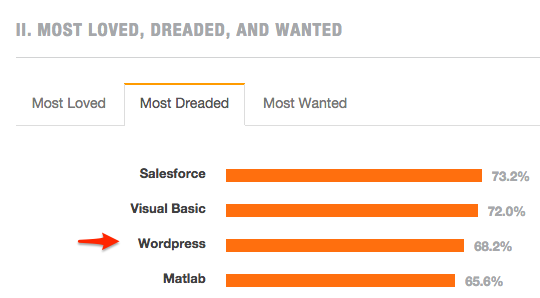I sat in a dimly-lit coworking space, chatting with a friendly local web entrepreneur – an unusual treat in northern Idaho, where the tech scene is…developing.
“So what do you do?” He asks.
“Mostly WordPress development” I confidently reply.
“Oh, WordPress. That’s pretty good if you need a site quick, right?” He smiles, but there’s something awkward about his smile. In his expression, I sense…pity. His next question reveals his thoughts:
“Have you ever tried Ghost? That’s getting really popular! Or do you have experience with Ember or Angular?”
My confidence takes a blow. I’m a programmer who hasn’t used any JavaScript-based frameworks. That’s like an accountant who hasn’t used a calculator because his abacus has worked fine so far, right?

Actually, no. I don’t believe that. But I admit that it crosses my mind: Am I picking a sustainable path for my business? After all, I’m going all-in on WordPress.
When it comes to software, I’m not an idealist. I love WordPress, but my enjoyment is not my primary concern. Supporting my family is priority #1, and that is what drives my business decisions.
Specializing in WordPress is primarily a business decision. I’d like to walk you through my thought process for the decision.
I think the opportunity for WordPress consultants is tremendous and getting better, making now an incredible time to make a living with WordPress. We’ll look at a few reasons why:
- Developers are running from WordPress
- Users are still choosing WordPress
- The numbers are just insanely good
Developers are running from WordPress
Recently, StackOverflow released their 2015 developer survey results, featuring responses from over 25,000 developers around the world. There’s lots of interesting data in there, but the most relevant for WordPress developers is found in the “Most Dreaded Technology” results:

There is WordPress (with a lowercase “p”), the 3rd most dreaded technology – nestled between two ancient languages and alongside long-hated proprietary software.
I’ve seen it firsthand. Outside of the WordPress Community bubble, developers loathe working with WordPress. When confronted with a WordPress project of any size, developers will, with their first breath, utter the unthinkable words in Software Engineering:
“Let’s rewrite this”.
WordPress makes developers uncomfortable. PHP isn’t cool; It hurts egos. When the popular kids drive up in their Angular-powered sports cars, developers don’t want to get caught in the situation at the beginning of this post: being forced to admit they work on uncool, dated, “dreaded” software.
While I don’t know the long-term effects this “dread” will have on WordPress, I do know that this developer flight is an incredible opportunity for developers willing to learn the “why” and “how” of WordPress.
Why is developer flight it a good thing for WordPress business? Supply and demand. The demand for WordPress isn’t slowing down.
Users are still choosing WordPress
You probably already know that WordPress powers an insane percentage of the internet. It’s difficult to measure, but numbers from 2014 say WordPress is powering between 18% – 20% of the internet, and it could be higher. That’s crazy.
What’s crazier is that WordPress usage is still growing, with some reports saying that 22% of new websites are running WordPress.
WordPress gets a lot of flak from developers & highly-technical end users, but the fact is that WordPress strikes a balance between:
- Ease of use
- Customizability
- New features
- Backwards-compatibility
Other CMSes don’t strike this balance. My personal experience tells me so:
I’ve tried to install & use Joomla! and Drupal. It took me a long time to understand the basics.
I’ve tried to use minimalist website/blog builders. When I wanted to do something like tweak <title> tags, I couldn’t. The software wasn’t mature enough to be extended. There were no plugins.
The WordPress core team is full of brilliant UI/UX-focused members whose goal is to make WordPress a pleasant experience for end users. I would wager that developer needs & wants are secondary in the long-term vision of WordPress – and that’s a good thing.
WordPress still wants to grow
Automattic raised a ton of money last year, and Matt Mullenweg‘s commentary reveals where that money is going (emphasis mine):
Things were and are going well, but there was an opportunity cost to how we were managing the company toward break-even, and we realized we could invest more into WordPress and our products to grow faster.
If Matt had said in 2007 that he wanted WordPress to power 20% of the internet by 2015, I probably would have laughed with everybody else. “IT’S BLOGGING SOFTWARE”, right? I’m not laughing any more. I would not be surprised if WordPress powered 30+% of the web in 8 years.
The $ amounts are crazy
By some estimates there are 75 million websites powered by WordPress.
I’m a fan of business pessimism. I prefer to assume the worst case when making calculations for my business, because it helps temper my expectations.
Let’s be pessimistic: Assume 90% of those sites have no budget at all for customization. That brings the total to 7.5 million websites powered by WordPress.
Let’s continue to be pessimistic: Assume each site has $100/year as a budget for customizations. That’s a tiny number.
Using our lowball numbers, the yearly spending on WordPress customizations is:
7,500,000 * $100 = $750,000,000
Approaching a billion dollars!
The spending on WordPress sites follows the 80/20 rule: 20% of those 7.5 million sites will spend 80% of the money. There are lots of WordPress sites without any budget, but the numbers are so large that it’s hard to deny the incredible (growing) opportunity in WordPress consulting.
Quality is hard to find
I won’t belabor this point, because it has been covered very thoroughly recently: Because of the popularity & ease with which WordPress can be modified, a whole slew of under-qualified (or overwhelmed, depending on your perspective) WordPress “experts” are in the wild selling services, plugins & themes.
I don’t necessarily fault the companies & individuals who are doing so – they are trying to make a living, and they probably don’t have malicious intentions.
Instead, I see this as an incredible opportunity for developers who work hard, don’t disappear, communicate well, and know how to code, beyond WordPress.
If you do all those things for your clients – especially those who had bad experiences in the past – you will see referrals & repeat work all the live long day.
Making the case for WordPress
Let’s sum it up:
- Right now, finding good WordPress developers is hard
- Developers in general are afraid of working on WordPress
- WordPress powers 20% of the internet
- WordPress is focused on end users and is still growing
Sounds like a great industry to be in, doesn’t it? That’s why I’m going all-in. I’ll be sharing the ups & downs of that decision on this blog.
I’d love to hear your experiences or disagreements with my observations!
Parasitic diseases complications The impact of parasitic infections on global health is significant, and understanding the range of Parasitic Diseases Complications is essential for effective medical intervention and prevention strategies, as these complications can vary from mild allergic reactions to severe organ damage, depending on the type of parasite and the individual’s overall health.

Julie Kuehl
15 May 2015I’m with you! And I really needed to hear this. I’ve had similar experiences with other developers, and made my decision to focus on WordPress for reasons close to yours. It was good to see that gut decision laid out with a bit of logic.
ivan
19 Jun 2015Don’t forget the up and coming REST API. I think it’s going to be HUGE for WordPress.
It has the potential to turn WP into a backend service for hundreds of thousands of new startups and medium sized companies.
Pablo N
31 Jul 2015Nice post! I think wordpress is not going to go anywhere, it’s a great cms and still a good deal.
I used Joomla and Drupal in other occasions, but it proved to be impractical, unintuitive and in the case of Drupal very slow…
But I must say that the views drupal module is excellent. There is nothing equal in wordpress.